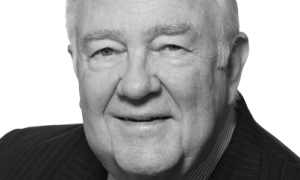Tomorrow, Feb. 6, is the 99th anniversary of the birth of Ronald Reagan, the 40th president of the United States. Although it has been 21 years since President Reagan completed his second term and left the White House, he still remains a figure of great interest to many Americans, including a large number of young people who were not even born during the time he was president.
New books come out about Reagan every year. The more research that is done about him, the greater the appreciation of what he accomplished and of him as a person. During 2008 Reagan was the president whose name was most mentioned in the debates of both parties, as an example of an effective leader the candidates wished to follow. Since he left office, Ronald Reagan has been the standard to which subsequent presidents have been compared. In numerous polls Reagan has been selected as one of the outstanding presidents in the history of the country.
Why this continuing interest and favorable treatment of a president from the 20th century—in many ways more favorable treatment than he received from the media while he was in office? The answer lies in both the accomplishments he achieved while in office and his leadership style, which inspired and encouraged the American people.
The history of the Reagan presidency shows how he revitalized the United States economy at a time of one of the most serious crises since the Great Depression of the 1930s. His program of lower tax rates across the board, regulatory reform, stable monetary policy, and slowing the growth of federal spending, produced the longest peacetime period of economic growth in the history of the nation. On the international front his strategy and actions rebuilt our national defense capabilities, restored the position of the U.S. in world leadership, and took the courageous actions that ultimately led to the end of the Cold War, with the cause of freedom winning.
Equally important in endearing him to the American people was Reagan’s style of leadership. He had a vision of where America should be going and he was able to communicate that vision to the American people. It depended greatly on his concept of why America was good and why the American people had achieved so much in what has been a relatively new nation on the face of the earth. He admired the Founders and was able to relate their ideas of liberty, civic virtue, and opportunity to the people of the current generation. Even in difficult times, his cheerfulness and optimism gave the people the hope that, as he would put it, “America’s best days are yet ahead.”
As with any president, not everything went well and Reagan faced many challenges, political opposition, and disappointments. Yet his faith in God and his faith in the American people enabled him to maintain his posture of enthusiastic leadership and ultimately to prevail over numerous obstacles.
As we look back a quarter-century to an era of great challenge at home and abroad, and to a time when America needed a great leader, we can be thankful that we had a president who was equal to the task.
Edwin Meese III is the Ronald Reagan Distinguished Fellow in Public Policy and Chairman of the Center for Legal and Judicial Studies at The Heritage Foundation.
First Appeared in The Daily Caller



